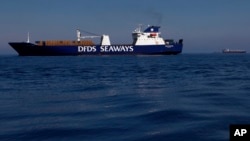WASHINGTON —
Syria has destroyed the vast majority of its chemical weapons arsenal as mandated by an international agreement.
The Organization for the Prohibition of Chemical Weapons (OPCW) says Syria has removed from its territory or destroyed in-country more than 92 percent of its declared stockpile of chemical weapons.
Greg Thielmann, an expert on weapons of mass destruction with the Arms Control Association, says Syria’s chemical weapons stockpile was substantial.
Mustard gas, sarin & more
“The total stockpile is something like 1,300 metric tons which would make it one of the largest existing operational chemical weapons stockpiles in the world. North Korea would be the only other competitor for that,” said Thielmann. “That having been said, one should also remember that the U.S. and the Soviet Union had such huge chemical weapons stockpiles that, even after many years of working on the destruction, [they] still have a lot of chemical weapons to destroy. But none of those stockpiles are operational in any way.”
Syria’s chemical weapons arsenal includes mustard gas, the more modern sarin and even VX, the most toxic of all chemical agents.
Last September, Syria agreed to dispose of its chemical weapons, under pressure from Russia and the threat of military action by the United States. Syria agreed to destroy all its chemical weapons by June 30.
Destruction 'very smooth'
Joe Cirincione, president of the Ploughshares Fund, a global security foundation, said, “The first part of this destruction process went very smoothly. That is, the chemicals were consolidated in about a dozen sites and secured. Remember, there is a civil war going on here.
“So there is always a concern that something could happen to these chemical weapons. The actual destruction began around October - the beginning of October 2013 - when you started to destroy some of the precursor chemicals in site.”
Precursor chemicals can be mixed together to create a toxic compound suitable for use as a weapon. Most of the agents to be destroyed are placed in large containers, moved to a port in Syria and loaded unto cargo ships, Thielmann said.
“It’s an American ship that is involved in destroying them. There are ships of other countries, though, that are transporting the bulk agent from the Syrian port to an American ship ... anchored off the coast of Italy, and the transfer would occur there.” Thielmann added. “There has been quite an elaborate process of not only having other countries involved in taking the agent away from Syria, but also countries have provided warships as escorts, to make sure that nothing happens to the chemicals on their way to the U.S. ship.”
Syria hesitant about last 8%
While more than 90 percent of Syria’s chemical weapons either have been destroyed or moved outside the country, experts say Damascus appears hesitant to relinquish the last eight percent of its arsenal.
Joe Cirincione said the Syrians have mentioned they are concerned about security on the roads between the port and the sites where chemicals are stored.
“But we also suspect that it’s tied to Syria’s demands that it be able to keep in place a network of tunnels and buildings that were used to store chemical weapons previously,” said Cirincione. “Under the terms of the agreement, these tunnels, these facilities are to be completely destroyed. Syria would like to re-purpose them, to hold them on for other purposes. That dispute is unresolved.”
Another potential dispute centers around allegations that the Syrian government has used chlorine gas over the past few months against civilians and rebel forces in different parts of the country. Damascus denies those charges, which are being investigated by the Organization for the Prohibition of Chemical Weapons.
The Organization for the Prohibition of Chemical Weapons (OPCW) says Syria has removed from its territory or destroyed in-country more than 92 percent of its declared stockpile of chemical weapons.
Greg Thielmann, an expert on weapons of mass destruction with the Arms Control Association, says Syria’s chemical weapons stockpile was substantial.
Mustard gas, sarin & more
“The total stockpile is something like 1,300 metric tons which would make it one of the largest existing operational chemical weapons stockpiles in the world. North Korea would be the only other competitor for that,” said Thielmann. “That having been said, one should also remember that the U.S. and the Soviet Union had such huge chemical weapons stockpiles that, even after many years of working on the destruction, [they] still have a lot of chemical weapons to destroy. But none of those stockpiles are operational in any way.”
Syria’s chemical weapons arsenal includes mustard gas, the more modern sarin and even VX, the most toxic of all chemical agents.
Last September, Syria agreed to dispose of its chemical weapons, under pressure from Russia and the threat of military action by the United States. Syria agreed to destroy all its chemical weapons by June 30.
Destruction 'very smooth'
Joe Cirincione, president of the Ploughshares Fund, a global security foundation, said, “The first part of this destruction process went very smoothly. That is, the chemicals were consolidated in about a dozen sites and secured. Remember, there is a civil war going on here.
“So there is always a concern that something could happen to these chemical weapons. The actual destruction began around October - the beginning of October 2013 - when you started to destroy some of the precursor chemicals in site.”
Precursor chemicals can be mixed together to create a toxic compound suitable for use as a weapon. Most of the agents to be destroyed are placed in large containers, moved to a port in Syria and loaded unto cargo ships, Thielmann said.
“It’s an American ship that is involved in destroying them. There are ships of other countries, though, that are transporting the bulk agent from the Syrian port to an American ship ... anchored off the coast of Italy, and the transfer would occur there.” Thielmann added. “There has been quite an elaborate process of not only having other countries involved in taking the agent away from Syria, but also countries have provided warships as escorts, to make sure that nothing happens to the chemicals on their way to the U.S. ship.”
Syria hesitant about last 8%
While more than 90 percent of Syria’s chemical weapons either have been destroyed or moved outside the country, experts say Damascus appears hesitant to relinquish the last eight percent of its arsenal.
Joe Cirincione said the Syrians have mentioned they are concerned about security on the roads between the port and the sites where chemicals are stored.
“But we also suspect that it’s tied to Syria’s demands that it be able to keep in place a network of tunnels and buildings that were used to store chemical weapons previously,” said Cirincione. “Under the terms of the agreement, these tunnels, these facilities are to be completely destroyed. Syria would like to re-purpose them, to hold them on for other purposes. That dispute is unresolved.”
Another potential dispute centers around allegations that the Syrian government has used chlorine gas over the past few months against civilians and rebel forces in different parts of the country. Damascus denies those charges, which are being investigated by the Organization for the Prohibition of Chemical Weapons.











